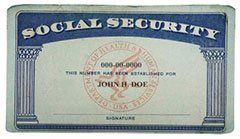CALL US TODAY!
Newsletter
Source One Client Newsletter
Please feel free to read our client newsletter. It is provided to keep you up to date on the latest tax and accounting news.
July 2016
Happy Independence Day!
While we look forward to the fireworks that mark the month, it is a perfect reminder to continue the fight against wide-spread identity theft. To that end, please review the articles on steps the IRS is taking to reduce fraud and the article on ideas to protect your Social Security Number. Articles on correcting IRS errors and ten clever vacation tips round out this month's newsletter.
Contents
- Protecting Your Social Security Number
- Ten Clever Vacation Tips
- The IRS is Not Always Right
- Plan for Tax Filing Season Changes
Protecting Your Social Security Number
Very few things in life can create a higher degree of stress and hassle than having your Social Security Number (SSN) stolen. This is because, unlike other forms of ID, the SSN is virtually permanent. While most instances of SSN theft are outside your control, there are some things that you can do to minimize the risk of this ever happening to you.

- Never carry your card. Place your SSN card in a safe place. That place is never your wallet or purse. Only take the card with you when you need it.
- Know who needs it. As identity theft becomes more of a problem, there are fewer who really need to know your Social Security Number. Here is that list.
- The government. The federal and state governments use this number to keep track of your earnings for retirement benefits and to ensure you pay proper taxes.
- Your employer.. The SSN is used to keep track of your wages and withholdings. It also is used to prove citizenship and to contribute to your Social Security and Medicare accounts.
- Certain financial institutions.. Your SSN is used by various financial institutions to prove citizenship, open bank accounts, provide loans, establish other forms of credit, and report on your credit history.
- The government. The federal and state governments use this number to keep track of your earnings for retirement benefits and to ensure you pay proper taxes.
- Know who really does not need it. Many other vendors may ask for your Social Security Number, but having it is not an essential requirement. The most common requests come from health care providers and insurance companies. But the request for your number may come from anyone who wishes to collect an unpaid bill. When asked on a form for your number, leave it blank. Challenge the provider if it is requested.
- Destroy and distort. Shred any documents that have your SSN listed. When providing copies of your tax return to anyone, distort or cover your SSN. Remember your SSN is printed on the top of each page of Form 1040. If the government requests your SSN on a check payment, only place the last four digits on the check. Prefill the first five digits with X's.
- Keep your scammer alert on high. Never give out your SSN over the phone or via e-mail. Do not even confirm your SSN to someone who happens to read it back to you on the phone. If this happens to you, file a police report and report the theft to the IRS and Federal Trade Commission.
- Proactively check for use. Periodically check your credit reports for potential use of your SSN. If suspicious activity is found, have the credit agencies place a fraud alert on your account. Remember, everyone is entitled to a free credit report once a year. You can obtain yours at
www.annualcreditreport.com
Replacing a stolen SSN is not only hard to do, it can create problems. You will need to re-establish your credit history, reassign your SSN benefits history, and realign your tax records. Your best defense is to stop the theft before it happens.
Ten Clever Vacation Tips
Summer often means vacations. And for those who wish to travel light with few surprises, here are ten clever vacation tips.
- The 5, 4, 3, 2, 1 rule. Having trouble packing light? Consider using a popular online technique called 5, 4, 3, 2, 1. There are a number of versions of this packing technique. Simply choose one that works best for you. Here is a typical example.
- socks/underwear
- shirts
- pants/slacks
- pair of shoes
- hat, toothbrush, brush, sunglasses, toothpaste, razor, shampoo, jewelry, etc.

- Dryer sheet in your luggage. As your trip goes by, your luggage is going to start filling with dirty clothing. A separate bag with a dryer sheet enclosed can help mitigate the stale smell of your soiled garments.
- Bring old clothes. Bring old t-shirts, underwear, shorts and socks. As they are soiled, leave them behind or donate them. The added space in your luggage can be used for newly found treasures.
- Leverage hotel disposables. Use a shower cap to store dirty shoes. Use their plastic laundry bag for your own to keep the dirty away from the clean. Find missing toiletries (like toothbrush, toothpaste, and combs) at the front desk.
- Use plastic. Place plastic wrap under the caps of things that can leak. Store toiletries in plastic storage bags. Bring a small trash bag for laundry and to keep wet things away from dry.
- Carry on snacks. Place some snacks in your luggage and other pre-packaged snacks in your travel bag. As long as they are sealed and not liquid, these low priced alternatives to airport fare can get through security.
- Keep an emergency set of clothes. If checking a bag, keep one set of clothing in your carry-on luggage. It might be just what you need if you end up at a destination different from your baggage.
- Keep copies of valuable items. Back up your computer, phone and other electronic devices prior to leaving on your trip. Make copies of your passport, driver's license, credit card numbers and other valuables. If things are then stolen, you can quickly get the information to those who need it.
- Roll rather than fold. Rolled clothing in suitcases have fewer wrinkles than items that are folded.
- Worry with priority. Everyone usually forgets something when leaving for vacation. Keep a short list of must haves and then go through a mental checklist of these "few" items prior to walking out the door. They might include:
- Picture ID (and/or passport for international travel)
- Cash
- Credit Card
- Tickets; confirmation numbers
- Picture ID (and/or passport for international travel)
Enjoy your vacation!
The IRS is Not Always Right
Quotes from actual IRS correspondence received by clients:
"Our records show we received a 1040X...for the tax year listed above. We're sorry but we cannot find it."
"Our records show you owe a balance due of $0.00. If we do not receive it within 30 days, appropriate collection steps will be taken".
"Payment is due on your account. Please submit payments on or before June 31st to avoid late payment penalties and interest."
It's pretty tough to pay a balance due of $0 on June 31st when June only has 30 days. The message should be clear. If you receive a notice from the IRS do not automatically assume it is correct and submit payment to make it go away. The same is true for any state notices. They are often in error. So what should you do?
- Stay calm. Try not to overreact to the correspondence. This is easier said than done, but remember the IRS sends out millions of notices each year. The vast majority of them correct simple oversights or common filing errors.
- Open the envelope. You would be surprised at how often clients are so stressed by receiving a letter from the IRS that they cannot bear to open the envelope. If you fall into this category try to remember that the first step in making the problem go away is to open the correspondence.

- Careful review. Review the letter. Make sure you understand exactly what the IRS thinks needs to be changed and determine whether or not you agree with their findings. Unfortunately, the IRS rarely sends correspondence to correct an oversight in your favor, but it sometimes happens.
- Respond timely. The correspondence received should be very clear about what action the IRS believes you should take and within what timeframe. Ignore this information at your own risk. Delays in responses could generate penalties and additional interest payments.
- Get help. You are not alone. Getting assistance from someone who deals with this all the time makes going through the process much smoother.
- Correct the IRS error. Once the problem is understood, a clearly written response with copies of documentation will cure most of these IRS correspondence errors. Often the error is due to the inability of the IRS computers to conduct a simple reporting match. Pointing the information out on your tax return might be all it takes to solve the problem.
- Certified mail is your friend. Any responses to the IRS should be sent via certified mail. This will provide proof of your timely correspondence. Lost mail can lead to delays, penalties, and additional interest on your tax bill.
- Don't assume it will go away. Until a definitive confirmation that the problem has been resolved is received, you need to assume the IRS still thinks you owe the money. If no correspondence confirming the correction is received, a written follow-up will be required.
Plan for Tax Filing Season Changes
In an effort to reduce the amount of money paid to identity thieves who file fraudulent returns, the IRS will be implementing changes in the timing and way they handle the processing of tax returns.
These steps will continue to evolve, but recent changes will impact millions who depend on receiving an early refund.
- Earlier filing of form W-2s and 1099-MISC. The timing required to send these forms to employees and vendors remains the end of January. However, the extended deadline for filing the electronic version of these forms to the IRS and Social Security Administration is now a full month earlier. This is done to allow the IRS to match records with early filed tax returns. The prior timing gap was ideal for thieves to file fraudulent tax returns.
- Earned Income Tax Credit and Additional Child Tax Credit. If you file a tax return that contains either of these credits, do not expect to receive an early refund. The IRS has been mandated to hold these refund payments until February 15th or later. Given the payment backlog this will create, it is still important to file early to get your refund in the queue.
- Get Transcript changes. The IRS is now adding a second level of security to their online functions. The initial version of this change is in the recently re-launched Get Transcript online request. You will now need to have a valid email, mobile phone number, and a credit card or financial account number to log into the system. If you are not ready to provide this additional information to the IRS you can still request copies of your tax return using the mail.
Begin planning now to be prepared for these upcoming changes. Rest assured, we can all look forward to further changes as the IRS continues to address the multi-billion dollar identity theft problem plaguing the Agency.
Content, including images, displayed on this website is protected by copyright laws. Downloading, republication, retransmission or reproduction of content on this website is strictly prohibited. Terms of Use
| Privacy Policy



